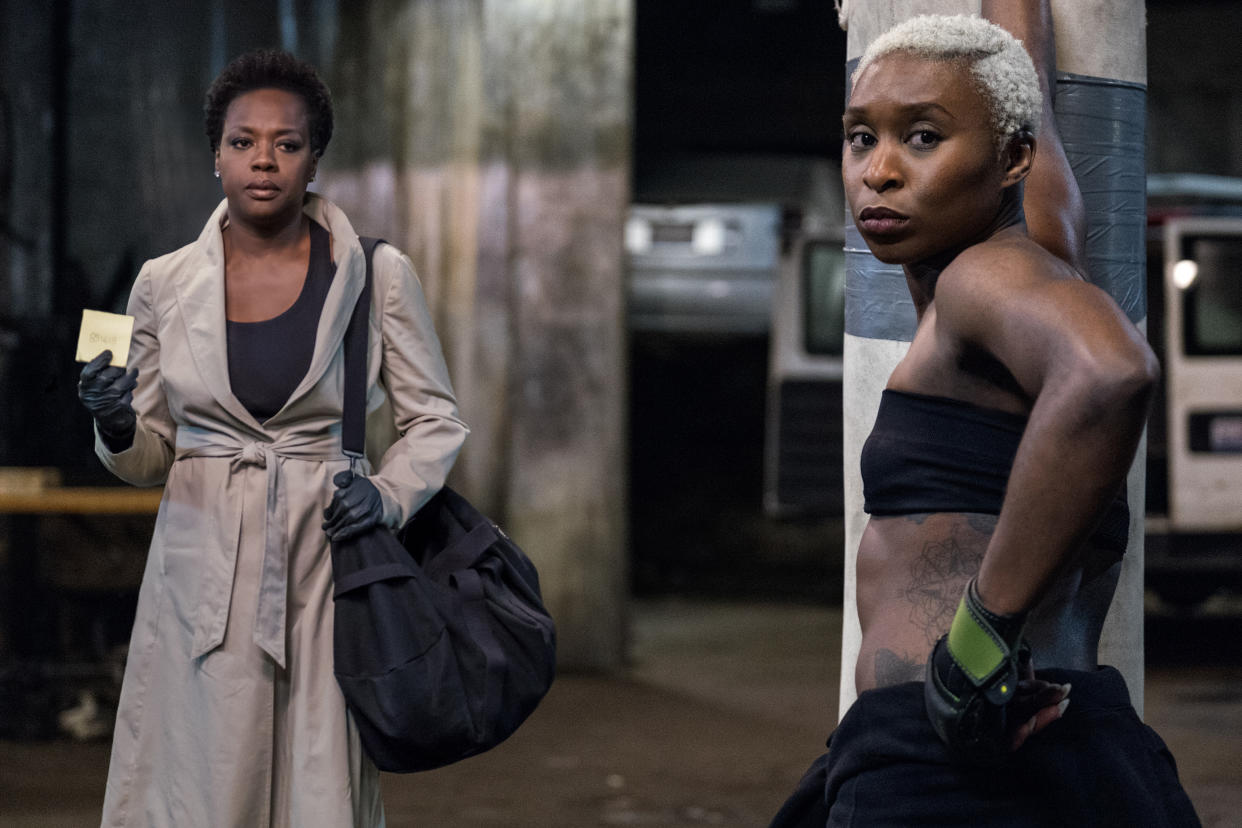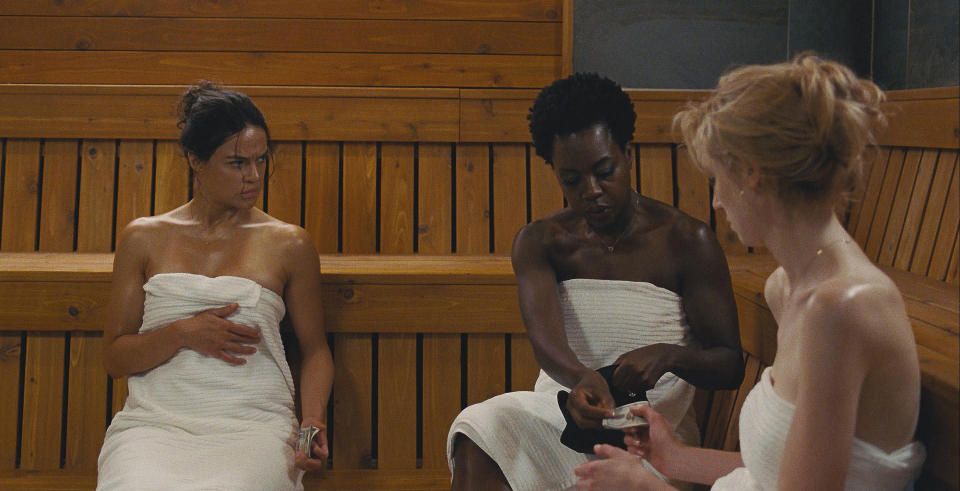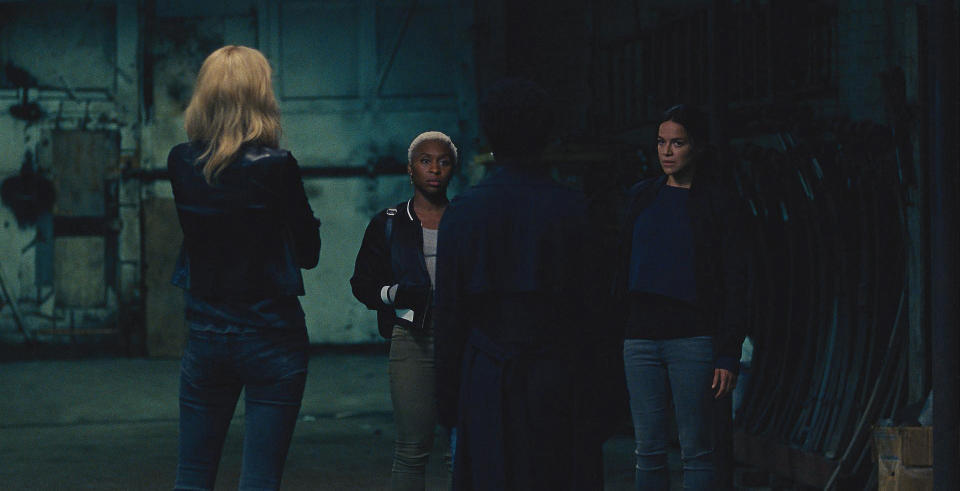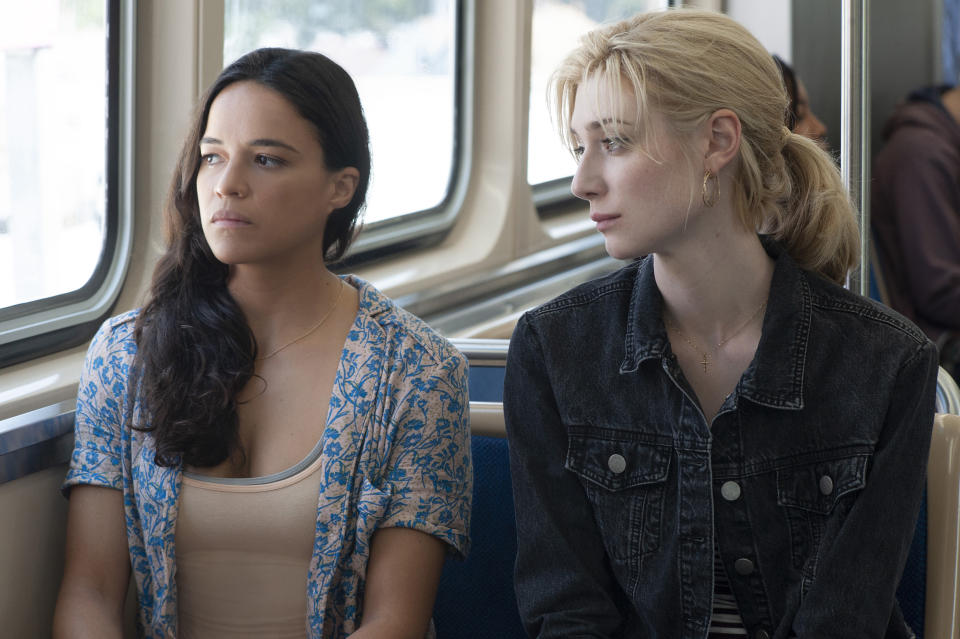Viola Davis and her 'Widows' co-stars break down the film's twisty ending (spoilers!)

This story contains major spoilers for Widows. Please proceed with caution.
The ending of Widows, like everything else about Steve McQueen’s dynamic crime drama, is not what you’d expect from a typical heist movie. The tense, captivating story of four Chicago women (Viola Davis, Michelle Rodriguez, Elizabeth Debicki and Cynthia Erivo) planning and executing a robbery after their criminal husbands and boyfriends are killed, doesn’t wrap anyone’s story up in a neat little bow. Instead, every character gets a final scene that hints at how the experience may or may not have changed her.
Veronica (Davis), who organized the heist, is grappling with the fallout of a devastating revelation: her assumed-to-be-dead husband (Liam Neeson) actually killed his co-conspirators and faked his death to start a new life without her. In the final scene, Veronica has a surprise encounter with Alice (Debicki), with whom she frequently clashed — but whose near-fatal injury during the heist appears to have changed her profoundly. Meanwhile, Rodriguez’s character Linda re-opens the bridal shop that was lost to her ex-husband’s debts, and Belle (Cynthia Erivo) decides to take off with her daughter, leaving some of her stolen money to a friend. Yahoo Entertainment spoke with the stars of Widows to get their thoughts on their characters’ journeys, and what they took away from the film’s last moments.
Davis (Veronica): What I loved about the end is, it was the first step towards Veronica wanting to connect, wanting to have friendship with another woman. During the course of the movie, her and Alice’s relationship is so contentious because they were brought together by necessity. In the end, you see how none of us are really connected anymore, because this necessity has been taken care of. But what’s left is something in Veronica that says, “This is a woman that I want to continue to be in my life.” I loved that. And it’s just a small kind of shift in the pendulum. It’s not “Kumbaya, let’s buy a house together in the south of France,” it’s just that small shift that you see in her to connect. That’s it. I loved it.

Debicki (Alice): When we first meet Alice, she’s so sheltered, but she’s so alone. And then even though she’s pushed together in these strange circumstances, and it’s really difficult and prickly and complicated to be among these women, it’s the first time she feels held by some kind of community and understood and seen. And she goes through this insane experience — I mean, she nearly dies. And so when we see her in the café [at the end] — first of all, I love that suddenly she’s dressed in a different way. She’s dressed for herself and not for men, which is really subtle in the way that Jenny [Eagan] our costume designer decided what she wears. But she’s really in her own body. And she looks like she’s kind of going on about her day [to her friend], and then she sees Veronica and there’s this huge chasm between them. And I remember shooting the scene and feeling so much grief at the idea that they can’t connect anymore. Because of everything Veronica says in the movie, like, “Once we do this heist, we’ll never see each other again.” I remember shooting that scene and feeling so sad for Alice, and for Veronica, because again, they were isolated. They were back where they started. So it’s so important, that moment at the end where they come together and they bridge the gap. And in such a simple way. I remember just feeling this enormous relief as Alice, that I wasn’t going to be alone. And I just think it’s a very powerful statement on female friendship and female community.

Erivo (Belle): I think for Belle, that moment of her being able to drive away in a car — it didn’t need to be a flashy car, but something that meant that she didn’t have to keep running — is a real moment of triumph. Usually we see these moments in a big flashy Mercedes or something, and they walk up the steps to the jet and look back at the camera and it’s all done. But for her, in that quiet moment with her daughter in her car, they’re together, they can get in this car and drive off. They’re not reliant on a bus or her running or anyone else. Now she can get to the places that she needs to get to without being in danger. This is a measure of true independence that this has afforded her. Which I think for her is an extravagance. This is a new luxury thing, because she hasn’t had it before. And I think it’s really wonderful to have given her that. And to be able to then give some of that to her friend, I think was wonderful. Because through the way in which she behaved with her friend, you saw that she loved her, which means she cared about people. And to give that back, even though she doesn’t have it herself, I think is just a testament to who she is, which I loved that we were able to do.

Rodriguez (Linda): And for Linda, I think the heaviest burden was having to carry her husband. I mean, I see this in a lot of Latina women in bad relationships who find themselves raising not only their kids, but their husbands too. And you know, the heaviness of being in that moment of despair prior to the heist, and that moment of not knowing if you’re going to be able to keep your kids, that everything around you has crumbled, was extraordinarily relieved by this moment of freedom — where she realized, you know what, maybe it’s OK for me as an individual to do this on my own, and get to this place where I get everything back, and it’s not lost. I think for her it was like a sense of freedom from all the responsibilities that she had before, that were weighing on her. And I think it was very beautiful and subtle and just liberating.
Read more from Yahoo Entertainment:


